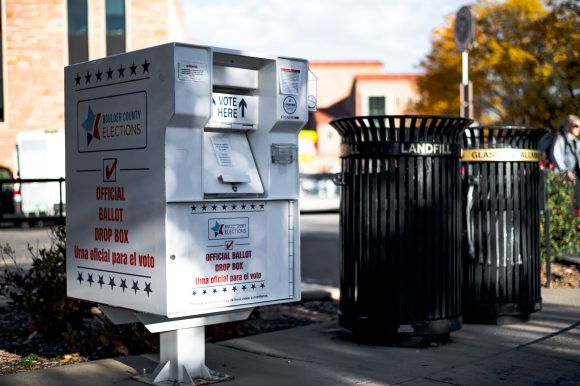
Voters can drop off a mail-in ballot at a 24-hour box, or can visit a voting center to vote in-person. Oct. 23, 2022. (Courtesy of Nathan Thompson)
National Voter Education Week marks the first week in October as Boulder election officials and voter advocacy leaders prepare for their November campaigns on the University of Colorado Boulder’s campus.
The week began as a voter education initiative in 2020 with the goal of making voting accessible and easy for all, including young and first time voters. Each day throughout the week represents a step in the process of voter engagement, ranging from registering to vote to learning what issues are on the ballot. Following this campaign, Boulder’s local government and student voter organizations are advertising their own upcoming voter engagement events for CU Boulder students.
Youth voter turnout has long lagged behind other age demographics, but not due to disinterest or apathy, according to Boulder County Election Clerk, Molly Fitzpatrick.
“Young people know that there’s a lot at stake with these issues that are being decided even at the local level,” she said. “I think it’s not an enthusiasm issue. It’s making sure that access is there for students to participate.”
The university has been successful in recent years in engaging student voter turnout. In 2020, the university reported that 80.3% of eligible CU Boulder students voted, up from 67.6% in 2016. These statistics were collected as part of the National Study of Learning, Voting and Engagement from Tufts University, the largest study of college voting in the US.
In 2016, CU Boulder was part of the first cohort of campuses to join the All In Campus Democracy Challenge, according to the executive director of the organization, Jennifer Domagal-Goldman.
“Part of [a university’s] mission is to prepare students for engagement in society and engagement with democracy in various ways,” she said. “And they actually are also required by federal law to help make a good faith effort to register eligible students to vote.”
Domagal-Goldman referred to the Higher Education Act of 1965 which obligates colleges to distribute voter registration information among eligible students
CU Boulder sent out their annual voter registration reminder via email to all registered students on Sept. 19 including instructions for both in-state and out-of-state students. Both in-state and out-of-state students can elect to vote in either their home county or in Boulder County by the registration deadline. In Colorado, voters can register through election day.
The primary barrier to students voting, Fitzpatrick said, is that, for many, this is their first time.
“The first time you do anything, it’s new and foreign,” she said. “It’s just getting through some of those mechanics for the first time. Once you do something a couple of times you get way more comfortable with it.”
This is why the Boulder County Elections Office and the university work together to get registration events on campus every year, she added, to create a “habit” of voting for students. They will host a center on campus to answer students’ questions and help with voting and registering starting Oct. 30. Ballot drop boxes will be placed at Williams Village and on the south side of the University Memorial Center for the November election.
Additionally, Fitzpatrick’s office is working on spreading awareness about the changes in Boulder’s local elections that will impact the ballot this year. This upcoming election marks the first time Boulder’s mayor will not be nominated by the city council, but rather by Boulder voters. With this system, candidates are voted for in order of preference and subsequently eliminated until a candidate wins more than 50% of the vote.
Both mayoral and city council candidates are set to participate in a free public forum hosted by the CU Boulder Student Government on Oct. 25 in the Wittemyer Courtroom on campus.
Domagal-Goldman recalled her experience as a busy college student during election season, trying to pass calculus and get along with her roommate.
“The fall of my first year was a presidential election and I certainly knew who I wanted to vote for for president,” she said. “But I think if my mom hadn’t sent me the stuff to remind me to request my absentee ballot, I think I would have missed the election.”
In the end, voting is not the only way to participate in democracy; however, it is the most readily accessible action, said Fitzpatrick.
“Young people care and young people will act on the issues that they care about, but voting is really efficient,” she said. “You register to vote online, you get a ballot in the mail, you vote that ballot and you turn it in.”
Addressing hesitant voters, Fitzpatrick said, “I know that you care about your community and your future; try voting and see how easy it is.”
Contact Breaking News Editor Ann Marie Vanderveen at ann.vanderveen@colorado.edu.
